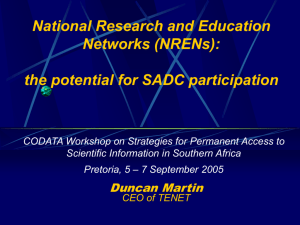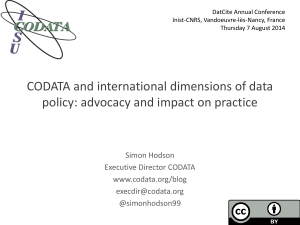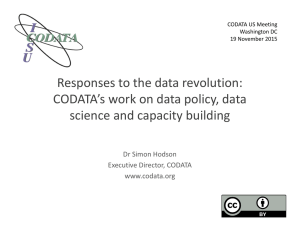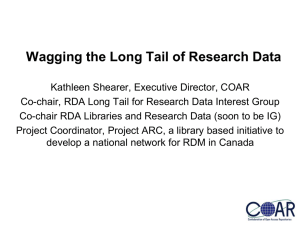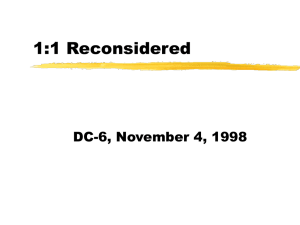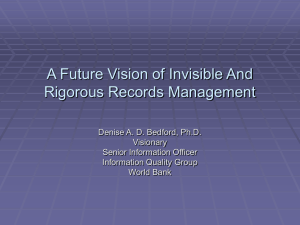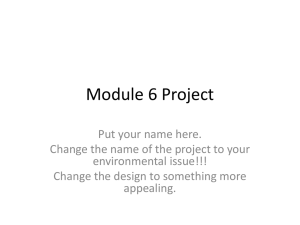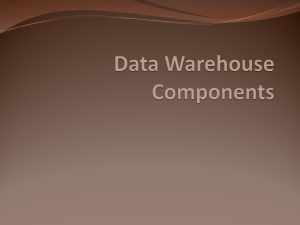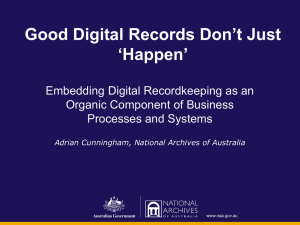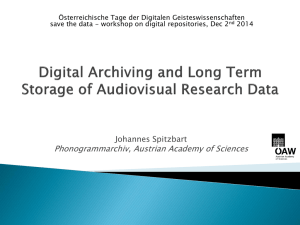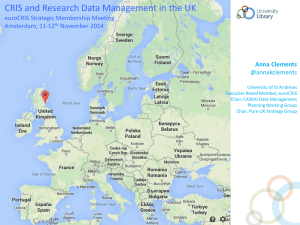Session 6 - Simon Hodson
advertisement
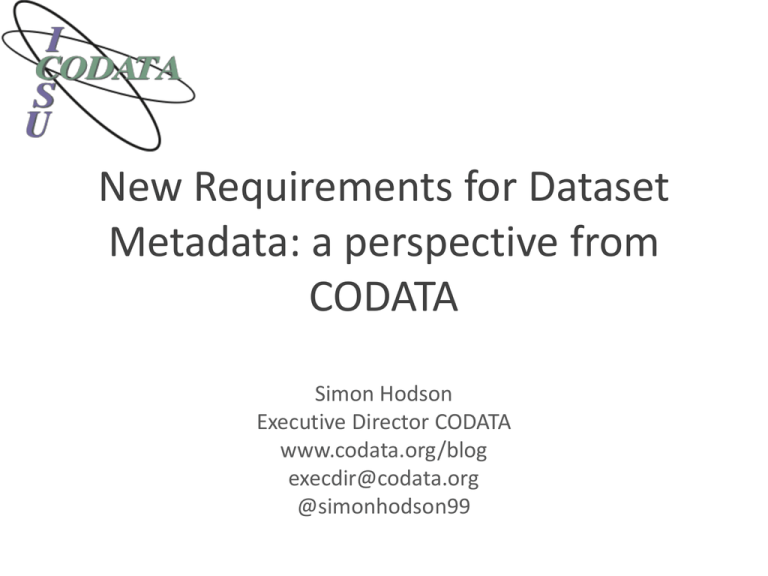
New Requirements for Dataset Metadata: a perspective from CODATA Simon Hodson Executive Director CODATA www.codata.org/blog execdir@codata.org @simonhodson99 New Requirements: dataset metadata How do euroCRIS stakeholders see new and emerging requirements for dataset metadata. How may CERIF evolve in the light of this. What cooperation/collaboration may be possible. CODATA is a strategic partner of euroCRIS: http://www.eurocris.org/Index.php?page=partners&t=1 New ED and a new Strategic Plan: http://www.codata.org/CODATA_Strategic_%20Plan_2013-2018.pdf Overview of CODATA activities. Sample of initiatives that may have some implications for dataset metadata. Some general points… Huge diversity of metadata standards. Importance of generic issues: time (for various functions), geographic locations/coverage, linking to publication, licensing, access control. Some examples from initiatives in ‘data publishing’ – providing a place for datasets linked to publications or a means of ‘publishing’ datasets. But requirements of datasets are not the same as those of publications. Importance of ‘assessability’ – provides a need for contextual information, provenance. Policy issues are significant drivers. But so is a significant desire on behalf of researchers to get credit for datasets. All have metadata as an important component of what is being done, but not the whole story: cultural aspects, business processes and issues of sustainability. What is CODATA? Mission: To strengthen international science for the benefit of society by promoting improved scientific and technical data management and use. An Interdisciplinary Body of ICSU, the International Council for Science. CODATA has been working at the forefront of data science since 1966 http://www.codata.org/about/CODATA@45years.pdf Not-for-profit, membership organisation (national members, scientific unions, affiliate members, members-at-large). CODATA is… An international community and network of expertise on data issues. An influential and authoritative voice in national and international policy regarding scientific data management. A focal point for international, cross- disciplinary collaboration and communication on key scientific data issues. What does CODATA bring to the table? Unique position comprises national members’ committees, International Union members, Task Groups, strategic initiatives, close relationship to ICSU. Genuinely international in reach • 23 National Members, many with very active national committees. • Model can encourage activity at national and international levels. • Recent new members: Mongolia, Finland, Czech Republic. Helps address data issues in international science programmes • Close association with ICSU (and WDS), supports strategic initiatives. • 16 International Scientific Union members. • Provides engagement with data challenges in particular disciplines and in transdisciplinary programmes. A community and forum for data science • Affiliate members and members at large. • Active Executive Committee • International Conference, Data Science Journal, Working Groups and Task Groups. Elements of Strategic Plan 2013-18 1. Policy frameworks for data: take the lead in defining a policy agenda for scientific data. • First step is to establish Data Policy Committee. Provide focus and expertise. • Support ICSU forum on Open Access. • Forum on data principles for publicly funded and international science. 2. Frontiers in data science and technology: coordinate work in key frontiers of data science and interdisciplinary application areas; capacity building activities. • CODATA workshop series on Frontiers of Data Science and Technology. • Important to partner other organisations, stakeholders; build on work of Task Groups. • Identify and support addressing of data issues in coordination with International Unions. • Current activities: nanotechnology, data for sustainable development, approaches to data recovery. • Expand CODATA’s capacity building activities, education and training activities including curriculum development. • Initiative to encourage Early Career Data Scientists. Elements of Strategic Plan 2013-18 2. Frontiers in data science and technology: (cont.) • International Science Data Conference, with WDS, New Delhi 2-5 Nov 2014. • Reinvigorate the Data Science Journal. • Task Groups http://www.codata.org/taskgroups/index.html includes Groups working on data citation, data challenges in microbiology, anthropometry, materials science and earth and space science; preservation and availability of data in developing countries; open data for global roads. 3. Data strategies for international science: support major ICSU scientific programmes to address data management needs (including infrastructure, policies, processes, standards). • Promote a coordinated data strategy for Future Earth • Promote a coordinated data strategy for Integrated Research on Disaster Risk CODATA Task Groups TGs are approved for two-years by the CODATA General Assembly; seed funding provided; benefit from community endorsement, linkages. 1. Advancing Informatics for Microbiology 2. Anthropometric Data and Engineering 3. Data Citation Standards and Practices 4. Data at Risk 5. Earth and Space Science Data Interoperability 6. Exchangeable Materials Data Representation to support Scientific Research and Education 7. Fundamental Physical Constants: 2010 CODATA constants http://physics.nist.gov/cuu/Constants/bibliography.html 8. Global Information Commons for Science Initiative 9. Global Roads Data Development 10. Linked Open Data for Global Disaster Risk Research 11. OCTOPUS: Mining Space and Terrestrial Data for Improved Weather, Climate and Agricultural Predictions 12. Preservation of and Access to Scientific and Technical Data in/for/with Developing Countries CODATA Nanomaterials CODATA longstanding series of Task Groups on materials data. ICSU and CODATA sponsored Workshop in February 2012 Representatives from 13 Unions, ISO 229, and other communities in attendance Recommended new project to establish multi-disciplinary, multi-user groups to establish requirements of nanomaterials description system CODATA and VAMAS (Versailles Project on Advanced Materials and Standards) established a Joint Working Group Invited 14 Unions and many nanomaterials experts. Two-year work plan includes international workshops. Participation in FP7 Future Nano Needs Project. Results to be given to ISO and other standards groups Slide credit, John Rumble CODATA Nanomaterials Part of a large European project: Future Nano Needs. Developing unified information model for describing nanomaterials. CODATA provides liaison role with international standards bodies and scientific unions to disseminate work and promote uptake of the information models and other outputs. Team working on the information model comes from the CODATA community. Need to describe properties (interaction) as well as measurements. Criteria for uniqueness and equivalency. Different requirements of different disciplines: Chemistry Physics Materials science Food science and technology Nutrition science Toxicology Environmental and ecology science Medicine Biology Slide credit, John Rumble Royal Society Science as an Open Enterprise Report, 2012 ‘how the conduct and communication of science needs to adapt to this new era of information technology’. Intelligent Openness: data should be accessible, assessable, intelligible, usable. ‘As a first step towards this intelligent openness, data that underpin a journal article should be made concurrently available in an accessible database. We are now on the brink of an achievable aim: for all science literature to be online, for all of the data to be online and for the two to be interoperable.’ Royal Society June 2012, Science as an Open Enterprise, http://royalsociety.org/policy/projects/scien ce-public-enterprise/report/ ICSU Consultation on Open Access and Metrics ICSU (International Council of Science) consultation on Open access to scientific data and literature and assessment of research by metrics. Contribute towards a report which will provide providing 'an analysis of the current situation and thinking on open access and the use of metrics and a statement of ICSU’s overall policies' with regard to these things.’ ICSU feels the need to clarify position, work with scientific unions on this. Concerns about the Gold OA business model (for data and publications) and where this leaves researchers without grant funding. What type of of metrics, to what end? Consultation workshop on 25 September involving ICSU members and to which CODATA is contributing. Data Citation, Standards and Practices Co-Chairs: Christine Borgman, Jan Brase, Sarah Callaghan; Consultant: Paul Uhlir; see http://www.codata.org/taskgroups/TGdatacitation/index.html Involvement of a range of key organisations and experts. Major Report Out of Cite, Out of Mind to be released in September 2013 Forceful set of ‘First Principles’ for data citation: 1. Status of Data: Data citations should be accorded the same importance in the scholarly record as the citation of other objects. 2. Attribution: Citations should facilitate giving scholarly credit and legal attribution to all parties responsible for those data. 3. Persistence: Citations should be as durable as the cited objects. 4. Access: Citations should facilitate access to data by humans and by machines. 5. Discovery: Citations should support the discovery of data and their documentation. 6. Provenance: Citations should facilitate the establishment of provenance of data. 7. Granularity: Citations should support the finest grained description necessary to identify the data. 8. Verifiability: Citations should contain information sufficient to identify the data unambiguously. 9. Metadata Standards: Citations should employ widely accepted metadata standards. 10. Flexibility: Citation methods should be sufficiently flexible to accommodate the variant practices among communities. The credibility and effectiveness of the research enterprise is due in large part to the social contract behind scholarly publishing. Researchers disclose their work to their peers in return for professional credit. In so doing, they also expose their findings to be confirmed or refuted, and enable other researchers to build upon their results. Dryad seeks to extend this social contract to research data by providing a model for how a disciplinary repository can motivate researchers to disclose the data that is of the greatest value for scientific reuse, that associated with publications, and realize the manifold benefits of free access to scientific data in perpetuity. http://datadryad.org/pages/about Vision ‘Open Data and the Social Contract of Scientific Publishing’ http://www.bioone.org/doi/full/10.1525/bio.2010.60.5.2 Dryad Data Repository Dryad Data Repository: http://datadryad.org/ Provides a home for the data underpinning research articles. Exploring a depositor pays business model: http://datadryad.org/pages/pricing Relying on low cost, low curation, high throughput business model. Emphasises researcher responsibility to ensure quality of data and metadata. Research Funder Research Project Gold OA Fee/APC Journal Dryad Dryad Data Repository Encourages citation of the data package as well as the article. Submission encourages: scientific names (species), spatial coverage, temporal coverage. Keen to explore ways of enhancing the service and this will rely on enhanced metadata: collections relating to particular subjects, data types, methods, funders etc. In part this rests assessability and making connections, on being able to draw in significant amounts of contextual information, identifiers and other metadata, from a ‘research information ecosystem’. Policies / Standards / Repositories Journal data availability policies: JorD project http://jordproject.wordpress.com/ reports that nearly 50% of journals sampled have a data availability policy of some sort (though only 25% of these can be characterised as ‘strong’). Journal policies generally not clear or specific about repository, standards etc. Interest in aligning journal policies with funder policies, help researchers comply. Clarify relations between Policies > Standards > Data repositories What are the policy requirements from funders, what is said if anything about standards and repositories? What standards have community uptake, are used in repositories? What repositories have accreditation, employ given standards, are recommended in policies. Build combined information resource: http://www.biosharing.org/ Contact: Susanna Sansone and Rebecca Lawrence Understanding Data Publication Processes: PREPARDe Project Examined and modeled a number of workflows for data publication (publishing data associated with research publications). Data repository accreditation. White paper of principles and recommendations on data peer review. Cross-linking between repositories and data publishers. White paper of principles of repository accreditation to be released. Scientific review of datasets. Report on publication processes. Requirements for a third party broker to facilitate multi-directional linking between datasets and literature. See http://proj.badc.rl.ac.uk/preparde/wiki/DeliverablesList and http://www2.le.ac.uk/projects/preparde NPG Scientific Data Open Access, online-only platform containing data descriptors that describe and explain datasets, supported by an APC model. Why this approach? Drivers: Researchers: credit for depositing and describing their data, helps researchers meet funder requirements. Funders: helps realise objectives for data availability and reuse (RoI). Scholarly communications: enhanced product, metadata approach hopefully makes more interesting to market. Data and metadata to be CC0, narrative has options ranging from CC BY to CC BY-NCSA Data descriptor provides detailed information about a dataset held in a third party repository (like Dryad or Figshare, but not limited to these). Data descriptor will be peer reviewed. NPG Scientific Data: Data Descriptors Data Descriptors use ISA Tab (Investigation, Study, Assay) Increasing use in life sciences, biomedical and environmental sciences. ‘Investigation’ (the project context), ‘Study’ (a unit of research) and ‘Assay’ (analytical measurement). Importance of metadata standards that capture research processes to some extent: e.g. DDI, ISA, CIF. Enrich with contextual metadata, methods, workflows, DMP info… Crystallographic Data Raises the question of which data should be available and described. Raw data (few MB-few GB) Reduced data (tens of kB-few MB) Structure data (few kB – ~1 MB) Established workflow and format for sharing structure data; but don’t always share derived data, and less frequently raw data. Why Publish Raw Crystallographic Data? Increasing use of validation for structure data: found, retrospectively that over 100 fraudulent structures had been published in Acta Crys. E from 2007-2009: http://www.iucr.org/__data/assets/pdf_file/0020/80273/MH_Publication-of-SmallMolecules.pdf Publishing raw data allows validation and checking. Above all has benefits for improving techniques for reduction and structure identification. Helliwell: publishing raw data allows improved refined software use, new results and wider uptake of improved approach: http://www.iucr.org/__data/assets/pdf_file/0004/80266/JRHelliwel_ECM28.pdf IUCr Diffraction Data Deposition Working Group working towards a recommendations on data deposit and for a federation of repositories. Information challenges likely to include: federated search portals, extraction of subsets of large data sets, establishment of automated procedures for expiring data sets, linking to publications, sorting by different criteria ... Slide credist: Brian McMahon, John Helliwell, Michael Hoyland. Federations of Data Repositories ICSU-World Data System: Prototype data portal. Working group on how to enhance this metadata: in particular by linking to other sources of data and information. Concept paper in preparation. ANDS Research Data Australia Now has nearly 90,000 collections! Uses RIF-CS as interchange format. Catalogue of data holdings in universities and data centres/labs. ReCollect App for Eprints Data Repositories http://bazaar.eprints.org/280/ Metadata approach from Research Data @ Essex Project Metadata Schema for Institutional Data Repositories http://www.data-archive.ac.uk/media/375386/rde_eprints_metadataprofile.pdf Thank You! Contact Simon Hodson Executive Director CODATA www.codata.org/blog Email: execdir@codata.org Twitter: @simonhodson99 Tel (Office): +33 1 45 25 04 96 | Tel (Cell): +33 6 86 30 42 59 CODATA (ICSU Committee on Data for Science and Technology), 5 rue Auguste Vacquerie, 75016 Paris, FRANCE
